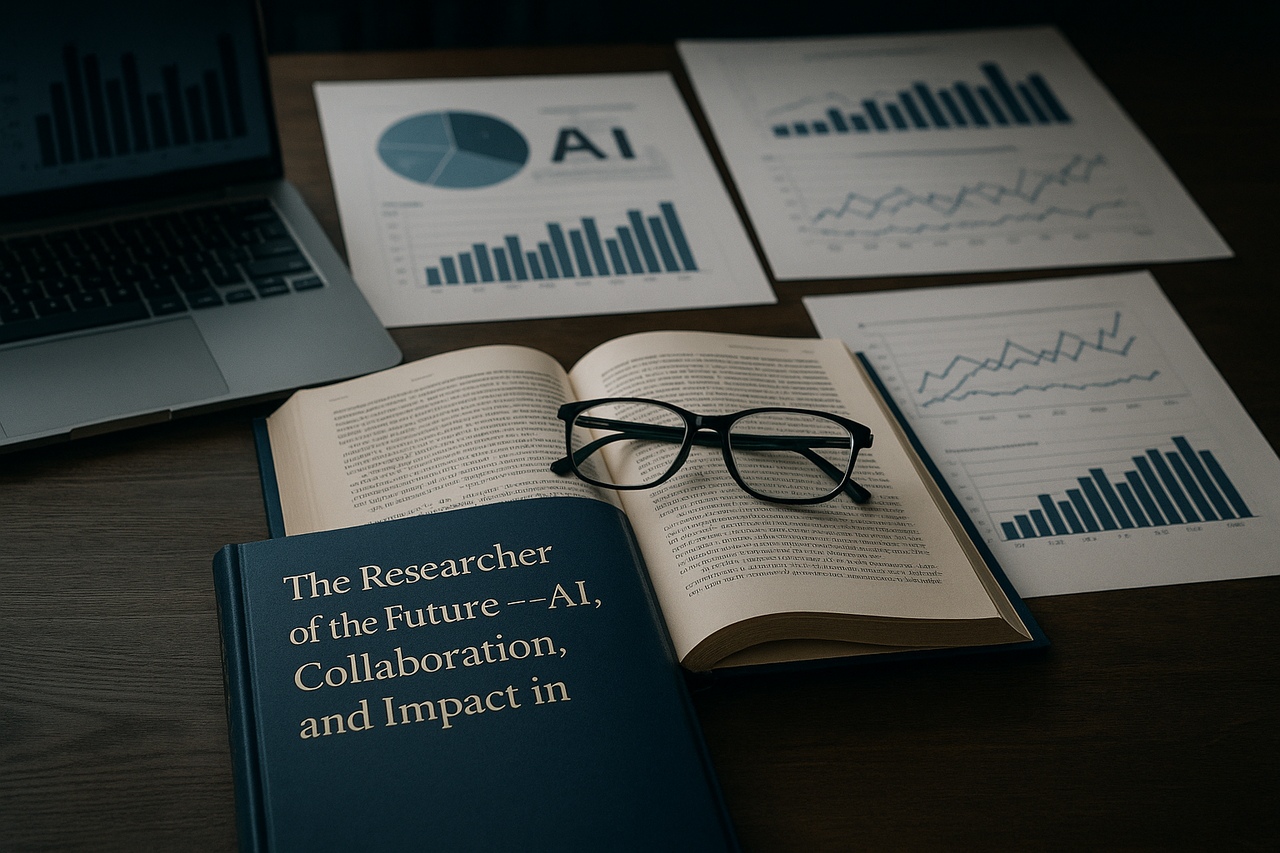The Researcher of the Future: AI, Collaboration, and Impact in a Changing Research Landscape
Published in Social Sciences, Research Data, and Computational Sciences

As the landscape of research continues to evolve rapidly, driven by technological advancements and societal demands, understanding how researchers adapt and innovate is more important than ever.
In recent years, the practice of research has been evolving at unprecedented speed. Artificial intelligence is no longer an experimental tool; global collaboration is reaching new heights, and researchers are increasingly motivated by the societal impact of their work. Elsevier’s Researcher of the Future report, based on a survey of over 3,200 researchers across 113 countries, paints a detailed picture of this transformation. The findings highlight both opportunities and challenges, offering important insights for researchers, institutions, funders, and publishers alike.
AI Is Changing How Research Gets Done
Artificial intelligence has become a routine part of many researchers’ workflows. From literature searches and summarization to data analysis and writing support, AI is now routinely integrated into research workflows. According to the report, 58% of researchers regularly use AI in their work, up from 37% in 2024. Common applications include literature review (51%), data analysis (38%), and drafting grant proposals or manuscripts (38–41%).
Yet the rapid adoption of AI is not without its challenges. Only 27% of respondents report having adequate training, and just 32% say their institutions have robust AI governance in place. Without proper training and oversight, the benefits of AI can be undermined by errors, bias, or misuse. The report underscores the need for clear governance frameworks and practical AI literacy programs to ensure that these tools enhance, rather than compromise, research quality.
Time Pressures and Funding Constraints
Despite technological support, researchers report significant pressures on their time. Only 45% feel they have enough time to dedicate to meaningful research, while 68% perceive increasing pressure to publish. Funding is another concern, with just 33% expecting increases in the near future.
These pressures create a tension between speed and quality. Researchers face a challenge between the pressure to produce outputs rapidly and the need for rigorous, impactful work. Institutions and funders have a critical role to play in alleviating this tension by providing adequate support, reducing administrative burdens, and redefining success metrics to value quality over quantity.
Integrity Remains at the Core
Despite the pressures of the modern research environment, the principles of research integrity remain strong. 74% of respondents trust peer-reviewed research, and 85% agree that corrections and retractions are essential to maintaining quality. Methodology is more valued than journal prestige or author reputation, signaling that researchers prioritize rigorous, transparent approaches over superficial metrics.
Maintaining these standards is particularly important in the era of AI, where outputs can appear plausible but may be flawed. Transparency, documentation, and human verification are essential safeguards for research quality. Publishers, too, play a key role in setting and enforcing standards for responsible use of AI and ensuring trust in scholarly outputs.
Collaboration and Mobility Trends
Global collaboration is on the rise. According to the survey, 63% of researchers collaborate more now than in previous years, with 68% working across disciplines and 53% collaborating internationally. Digital tools have enabled researchers to connect and work together across borders more efficiently than ever before.
At the same time, physical mobility is declining. Only 29% of researchers are considering relocating internationally for work. While digital collaboration compensates to some extent, reduced mobility may limit informal knowledge exchange and the career benefits historically associated with relocation. Supporting both remote and in-person collaboration remains a priority for research organizations.
Research with Impact
A striking trend highlighted by the report is the increasing focus on societal impact. 67% of researchers report that their work now addresses pressing societal challenges, and 50% believe research should always have real-world benefits. Public engagement, policy advising, and outreach are becoming integral to the research role.
This shift has implications for how institutions and funders evaluate success. Traditional metrics, such as publication count or journal impact factor, are no longer sufficient. Recognition of interdisciplinary work, mission-driven research, and societal engagement is increasingly necessary to reflect the evolving priorities of the research community.
Regional Differences and Equity Considerations
The report also reveals significant regional variation in AI adoption, mobility, and resource access. Asia-Pacific researchers, for instance, adopt AI more rapidly but are less mobile internationally, whereas North American researchers show higher mobility. These disparities highlight the risk of widening global inequalities. Addressing these gaps requires investment in training, infrastructure, and policies that ensure all researchers have equitable access to tools, networks, and funding opportunities.
These regional disparities have important consequences for the adoption of AI, collaboration, and overall research quality.
Implications
Artificial intelligence has become ubiquitous in modern research, but its widespread use also highlights the urgent need for proper governance and training. Without clear oversight, there is a real risk of misuse, errors, or over-reliance on AI outputs that may compromise research quality. Researchers and institutions alike must prioritize AI literacy programs and develop frameworks to ensure responsible adoption.
At the same time, rising time pressures and uncertain funding are threatening the depth and quality of research. Many researchers feel squeezed by administrative duties and the expectation to publish frequently, which can divert attention from meaningful, rigorous work. Institutions and funders have a critical role in protecting dedicated research time and rewarding contributions that reflect both quality and impact.
Despite these pressures, integrity and methodological rigor remain central to scholarly work. Trust in peer review, transparency, and careful adherence to research methods continue to guide researchers in producing reliable and reproducible findings. These principles provide a stable foundation, particularly in an era where digital tools and AI are rapidly changing research practices.
Collaboration is increasing across disciplines and borders, yet physical mobility is decreasing. Digital collaboration tools can help bridge geographical gaps, but they cannot fully replace the informal knowledge exchange and career opportunities that in-person mobility has historically provided. Supporting both digital and physical avenues for collaboration will be essential for sustaining vibrant research networks.
There is also a clear trend toward impact-driven research. Researchers are increasingly focused on societal relevance, public engagement, and mission-oriented projects. Institutions and funders are therefore encouraged to recognize and reward work that addresses real-world challenges, alongside traditional academic metrics.
Finally, regional differences in AI adoption, mobility, and resource access highlight the persistence of global inequalities. Targeted support is needed to ensure equitable access to training, tools, and funding, so that all researchers—regardless of location—can participate fully in the evolving research landscape.
Conclusion
The researcher of the future is AI-enabled, collaborative, mission-driven, and integrity-conscious. Yet these opportunities come with responsibilities: researchers, institutions, funders, and publishers must work together to provide training, governance, and support to ensure that technology enhances research rather than undermines it. By aligning incentives with societal impact, methodological rigor, and collaboration, the global research community can foster a more responsible, equitable, and impactful future for science.
Looking ahead, fostering equitable access to AI tools, promoting responsible adoption, and aligning research incentives with societal impact will be essential to ensure that the next generation of research remains rigorous, inclusive, and transformative.
Reference
Elsevier. (2025). Researcher of the Future – Confidence in Research. Elsevier Insights.




Please sign in or register for FREE
If you are a registered user on Research Communities by Springer Nature, please sign in